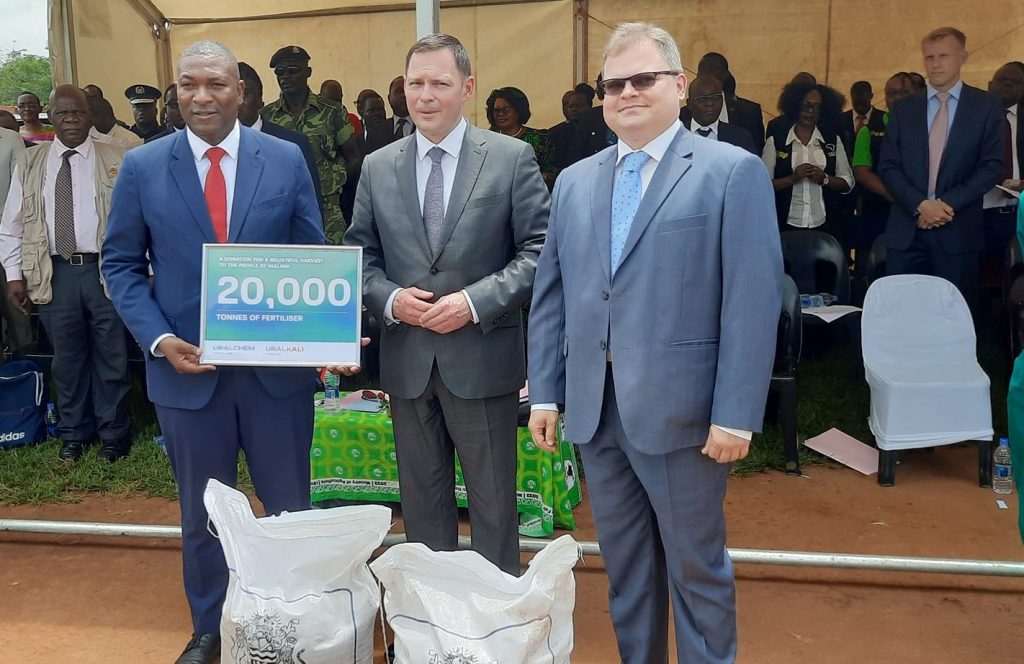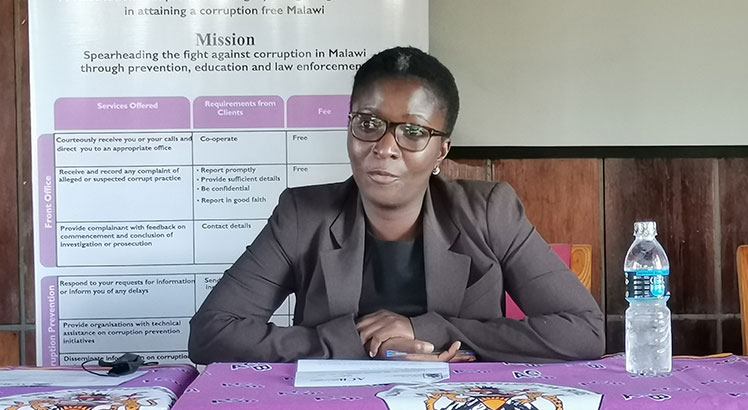Recently, Russia’s ambassador to Malawi said he hopes African leaders will call for an end to the international sanctions against Moscow at an upcoming Russia- Africa summit.
Nikolai Krasilnikov made the comment when Russia handed over 20 000 tonnes of fertiliser to Malawi.
Kawale (L) presides over the handover of the fertliser from Russia
An analyst says Russia is likely trying to win diplomatic support for its war in Ukraine, which Malawi twice voted against at the United Nations General Assembly in New York.
The donation amounts to three percent of Malawi’s annual national fertiliser requirement of 600 000 tonnes.
During the handover ceremony, Malawi’s Minister of agriculture Sam Kawalesaid the fertiliser is a major boost for the country amid shortages in the government-sponsored Affordable Inputs Programme, which sells seeds and fertiliser to poor farmers at cheaper prices.
“The 20 000 tonnes will help about 400000 families,” Kawale said. “We are estimating that 800 000 metric tonnes of maize will be harvested, either using the rain-fed or irrigation.”
The donation is part of the UN-brokered Black Sea Grain initiative, designed to end the disruptions in Russian and Ukrainian food exports caused by Russia’s invasion of Ukraine last year.
The Associated Press quoted Krasilnikov saying he hopes African leaders will help press to remove sanctions against Moscow at a July Russia-Africa summit.
He said overall, Russia has given 260 000 tonnes of fertilisers to poor countries in Africa and other parts of the world.
“So, what we have now as the delivery to Malawi, is part of a big commitment of Russia being fulfilled by Uralchem-Uralkali, the main Russian manufacturer of fertilizer and one of the world’s leading producers and exporters of fertilisers,” Krasilnikov said.
Political analyst George Phiri said the donation may be driven by Russia’s desire to win more African support at the UN and against the sanctions that many Western countries placed on allies of President Vladimir Putin following the Russian invasion of Ukraine.
“In my view, it is possible that Russia would want to mobilise some African countries to be on her sideand Malawi could be one, looking at how many African countries are voting against Russia,” he said.
At the UN General Assembly last year, Malawi voted to censure Russia for its invasion of Ukraine, but more than 15 other African countries abstained from the vote.
Krasilnikov said Putin has invited Malawian officials to attend the Russia-Africa Summit slated for July in Moscow.
He stated: “We expect a delegation from Lilongwe to the summit,” Krasilnikov said. “As well as we expect the Malawian business community from all over the country to come to the economic forum.
“And we encourage all interested to approach the Russian embassy in Zimbabwe, where my residence is, to come and find all necessary requirements and details.”
Kawale told journalists that Malawi has welcomed the Russian invitation.
In August 2022, Malawi President Lazarus Chakwera had a phone conversation with President VolodymyrZelenskyy of Ukraine and assured him of Malawi’s support as Ukraine continued to defend itself from Russia’s attack.
Mixed diplomacy
Meanwhile, Russia has since pledged to assist Malawi to fight its worst cholera outbreak that has now killed over 1 600 within a year.
Phiri said it will be confusing if Malawi changes tune and begins to give support for Russia.
“Malawi seems to have a mixed position,” Phiri said. “I think it would be important for Malawi to decide whether for Russian Ukraine because now, Malawi shows that it has not decided on which team it supports.”
Phiri said Russia would only win support from African countries if it could make better economic deals than what the countries normally get from their Western development partners.n
Africa ties are a priority—Putin
Last month, Putin told African leaders, minus Malawi’s Lazarus Chakwera, that he gave “priority” to relations with African countries, as Moscow was looking for new partners to face international sanctions over the conflict in Ukraine.
Putin said during a speech to African representatives gathered in Moscow last month: “I want to emphasise that our country has always given and will continue to give priority to cooperation with African states,”
“Our country is determined to continue building a full strategic partnership with our African friends, and we are ready to shape the global agenda together.”
Putin believed that Russia, like Africa, “defends traditional moral values” by “resisting the neo-colonial ideology imposed from abroad”. He also promised to supply “the neediest countries in Africa” with cereals if the important agreement on Ukrainian exports was not renewed in two months.
According Putin, Russia plans to increase cooperation with African countries in the field of energy and medicine and to double the quotas of African students in Russian universities.
Against the backdrop of Western sanctions linked to its offensive in Ukraine, Moscow is currently seeking support in Asia and Africa, where many states have not openly condemned the Russian military intervention.
Russia had already multiplied initiatives on the African continent in recent years, aimed at posing as an alternative to the former colonial powers.
It signed numerous economic and military partnerships there and the Russian paramilitary group Wagner established itself in several countries, notably in the Central African Republic, where it contributed to eroding French influence.
The next Russia-Africa summit, the second of its kind, is due to be held July 26 to 29 in St. Petersburg.
Putin promised to prepare “very seriously” for this meeting and invited African leaders and regional organisations to take part.
At the first summit in 2019, Putin was pleased to have “opened a new page” of relations with Africa, a continent from which Russia had largely withdrawn after the fall of the USSR.
This meeting saw the presence of representatives from 54 African countries, including 43 heads of State, including Chakwera’s predecessor Peter Mutharika.
The joint statement adopted at its conclusion denounced in particular “political diktats and monetary blackmail.—AfricaNews
The post Double-edged diplomacy first appeared on The Nation Online.
 Moni Malawi
Moni Malawi 

